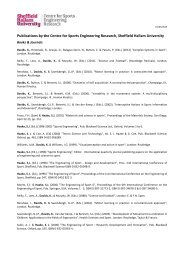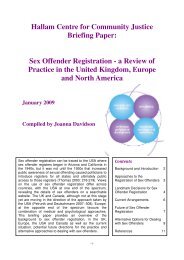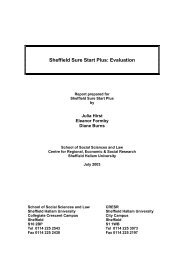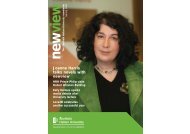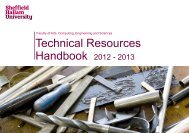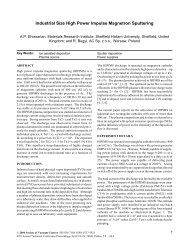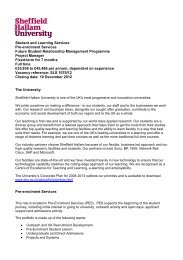The exercise of judicial discretion in rent arrears cases - Sheffield ...
The exercise of judicial discretion in rent arrears cases - Sheffield ...
The exercise of judicial discretion in rent arrears cases - Sheffield ...
You also want an ePaper? Increase the reach of your titles
YUMPU automatically turns print PDFs into web optimized ePapers that Google loves.
Chapter 5: Judges and landlords<br />
Introduction<br />
In this chapter, we consider how the relationship between the district judges and claimant<br />
landlords impacted, if at all, on decision-mak<strong>in</strong>g <strong>in</strong> <strong>in</strong>dividual <strong>cases</strong>. It might be posited that<br />
the social reality <strong>of</strong> decision-mak<strong>in</strong>g ‘on the ground’ would mean that the relationship<br />
between judges and claimants would impact on the outcome. <strong>The</strong> ‘repeat player’ nature <strong>of</strong><br />
the claimants (see Galanter, 1974), their position with<strong>in</strong> both tenure relationships and<br />
society, as well as the length <strong>of</strong> time allocated <strong>in</strong> some courts per case, all suggest that<br />
outcomes might be affected by this relationship.<br />
<strong>The</strong> fact that a degree <strong>of</strong> trust and confidence developed between judges and landlords was<br />
noted <strong>in</strong> the study by Nixon et al (1996). This particularly affected the confidence which<br />
judges placed on the <strong>in</strong>formation which the landlord gave them. In the cur<strong>rent</strong> study,<br />
claimant representatives <strong>in</strong> the focus groups felt that their familiarity with the district judge<br />
could help sometimes, <strong>in</strong> that <strong>cases</strong> were easier to present when they knew the particular<br />
judge’s approach, and a “good judge will remember reasonable or good organisations”. In<br />
the defendant focus groups there was some doubt about the impact <strong>of</strong> the relationship<br />
between judge and claimant’s representatives. First, it was said that this could <strong>in</strong>fluence the<br />
outcome, for example, where the judge was aware that the claimant habitually overstated<br />
their case. Second, the closeness <strong>of</strong> the relationship could unsettle the defendant: “Actually,<br />
its importance is not about the <strong>in</strong>fluence but about the impact it has on the proceed<strong>in</strong>gs, how<br />
they are perceived”.<br />
We asked the district judges <strong>in</strong> our <strong>in</strong>terview sample about their relationship with the<br />
landlords who appeared <strong>in</strong> front <strong>of</strong> them, and, <strong>in</strong> particular, whether requests made by the<br />
claimants impacted on their decision-mak<strong>in</strong>g process. Some judges <strong>in</strong> our sample asserted<br />
their neutrality <strong>in</strong> response to this question: “it’s a <strong>judicial</strong> relationship” (DJ B); “I mean, all<br />
our tra<strong>in</strong><strong>in</strong>g, and not just as a judge but as lawyers, you know, teaches us that you keep the<br />
acqua<strong>in</strong>tanceship apart from the argument” (DJ L). Some judges spoke <strong>of</strong> the need to resist<br />
‘cosy’ relationships whilst, nevertheless, hav<strong>in</strong>g “a good relationship with them because<br />
they’re <strong>in</strong> here all the time” (DJ O).<br />
We discuss how and why trust arises <strong>in</strong> the relationship between judges and claimants <strong>in</strong> the<br />
second section below. However, before we discuss this, we consider whether our<br />
42



